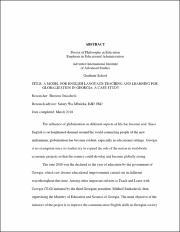| dc.description.abstract | The influence of globalization on different aspects of life has become real. Since
English is on heightened demand around the world connecting people of the new
millennium, globalization has become evident, especially in educational settings. Georgia
is no exemption since its leaders try to expand the role of the nation in worldwide
economic projects so that the country could develop and become globally strong.
The year 2010 was the declared as the year of education by the government of
Georgia, which saw diverse educational improvements carried out in different
waysthroughout this time. Among other important reforms is Teach and Learn with
Georgia (TLG) initiated by the third Georgian president, Mikheil Saakashvili, then
supervising the Ministry of Education and Science of Georgia. The main objective of the
initiators of the project is to improve the communicative English skills in Georgian society
2
by bringing 1,000 native English speakers as teachers into Georgian schools. The founders
believed that together with teachingand learningprocesses in English foreign teacherscan
share their cultureandworldview with them.
The exploratory nature of the study required a qualitative case study design and
narrative analysis for reporting the results. For data collection, I used (a) in-depth
interviews with 18 participants and (b) documents. Government officials, school
principals, and Georgian English teachers from different parts of Georgia were the
participants of this study who were purposively selected.
Findings highlighted the nature of TLG project, methods used by Englishteaching
volunteers in their teaching process, contributions of TLG project on English
teaching and learning in Georgia, and challenges that the project encountered during the
process. And finally, this study suggests an exemplary teaching model based on teacher
recruitment (hiring professional native teachers), teacher professional development
(cultural orientation, collaboration, and training), instructional materials (textbooks and
printed and non-printed materials), and pedagogy (communicative language teaching,
whole teaching method, and co-teaching). All of these were found to be beneficial in
enhancing the English language teaching and learning in Georgia. | en_US |

